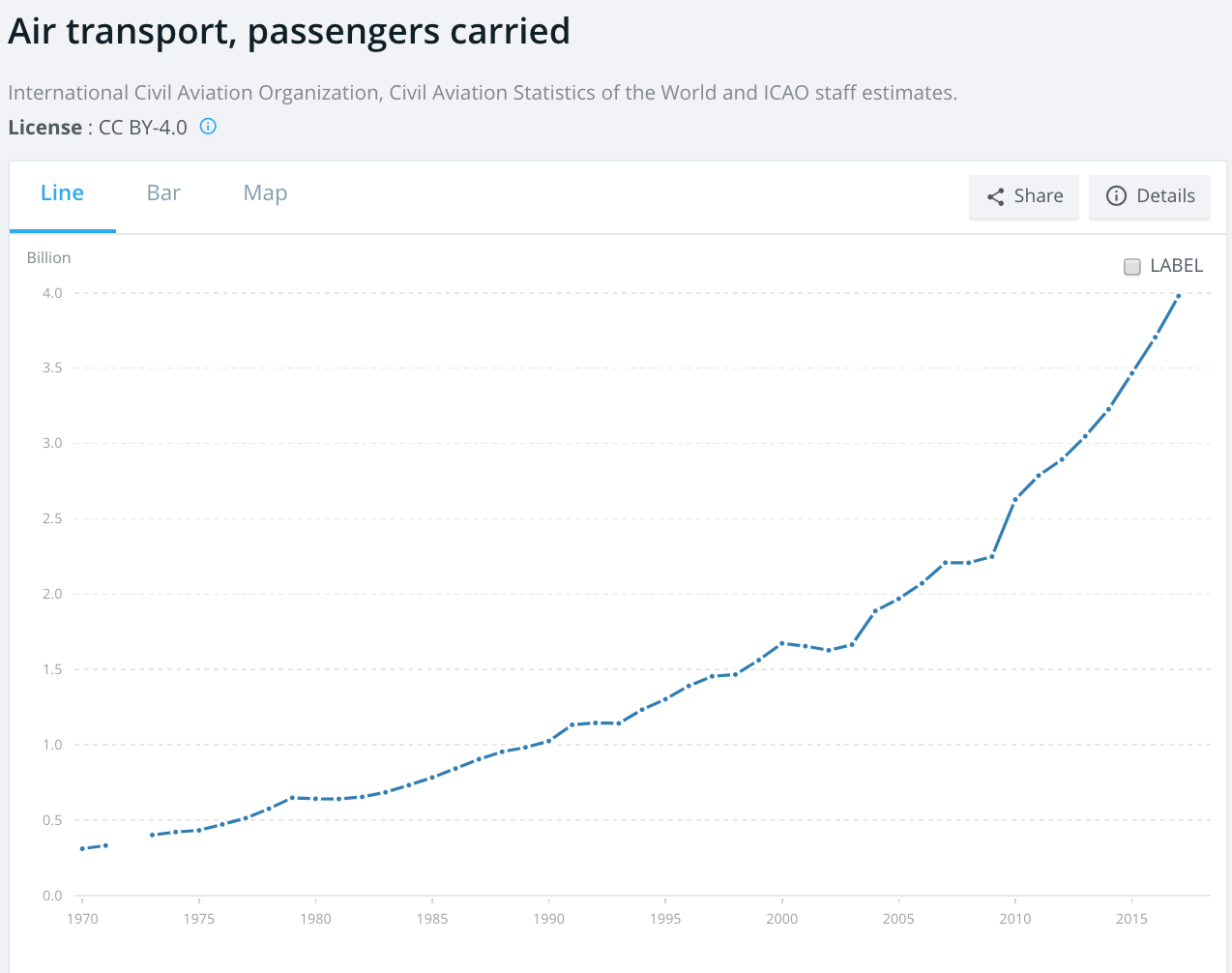4.4 billion air trips taken world wide in 2018; number was 2.63 billion in 2010
IATA data show more Britons travelled abroad last year than any other nationality, when 126.2 million air trips were made by Brits – which is 8.6%, roughly one in 12, of all international air travellers. The UK was followed by the USA (111.5 million, or 7.6% of all passengers) and China (97 million, 6.6%). In total there were 4.4 billion air passenger journeys (that does not mean that number of people flew – many take multiple flights, and even in rich countries, many people do not fly at all, or not in any one year). The 4.4 billion is an increase of 6.9% compared to 2017. The number was 2.63 billion in 2010. There were 1.674 billion in 2000. The load factor on average across airlines was only 82%. IATA’s Director General, Alexandre de Juniac, does admit there is “an environmental cost that airlines are committed to reducing.” But any possible future cuts in aviation CO2 are tiny, dubious, and far ahead. In 2018, Asia had 1.6 billion passengers, (37% of market share), which grew by 9.2% over 2017. Europe had 1.1 billion passengers ( 26.2% of market share), up 6.6% over 2017.
.
Tweet
https://data.worldbank.org/indicator/IS.AIR.PSGR
More Connectivity and Improved Efficiency – 2018 Airline Industry Statistics Released
IATA press release
31st July 2019
Montreal – The International Air Transport Association (IATA) released performance figures for 2018 showing that global air connectivity continues to become more accessible and more efficient. The IATA World Air Transport Statistics (2019 WATS) confirms that:
- 4.4 billion passengers flew in 2018
- Record efficiency was achieved with 81.9% of available seats being filled
- Fuel efficiency improved by more than 12% compared to 2010
- 22,000 city pairs are now connected by direct flights, up 1,300 over 2017 and double the 10,250 city pairs connected in 1998
- The real cost of air transport has more than halved over the last 20 years (to around 78 US cents per revenue tonne-kilometer, or RTK).
”Airlines are connecting more people and places than ever before. The freedom to fly is more accessible than ever. And our world is a more prosperous place as a result. As with any human activity this comes with an environmental cost that airlines are committed to reducing. We understand that sustainability is essential to our license to spread aviation’s benefits. From 2020 we will cap net carbon emissions growth. And, by 2050, we will cut our net carbon footprint to half 2005 levels. This ambitious climate action goal needs government support. It is critical for sustainable aviation fuels, new technology and more efficient routes to deliver the greener future we are aiming for,” said Alexandre de Juniac, IATA’s Director General and CEO.
….. and there is much more at
https://www.iata.org/pressroom/pr/Pages/2019-07-31-01.aspx
.
World Bank data
This shows the vast increase in air passengers world wide over the past 30 years or so.
The growth in air passengers worldwide. From The World Bank. (IATA says 4.4 billion in 2018). in 2017 there were 3.979 bn. In 2015 3.466 bn. In 2010 2.628 billion. In 2005 1.97 billion. In 2000 there were 1.674 bn. In 1995 1.391 bn. In 1990 1.025 bn

https://data.worldbank.org/indicator/IS.AIR.PSGR
.
MORE BRITISH PEOPLE FLEW ABROAD LAST YEAR THAN ANY OTHER NATIONALITY, NEW DATA REVEALS
By Cathy Adams (The Independent)
@Cathman
More Britons travelled abroad last year than any other nationality, according to official data from the international trade body for aviation, IATA.
In 2018, 126.2 million passengers were British – totalling 8.6%, roughly one in 12, of all international travellers.
The UK was followed by the US (111.5 million, or 7.6% of all passengers) and China (97 million, 6.6%).
Data from the International Air Transport Association (Iata) shows that 4.4 billion passengers flew in 2018, an increase of 6.9% from 2017.
That represents an additional 284 million trips by air year-on-year.
According to Iata’s World Air Transport Statistics, 22,000 pairs of cities were connected by direct flights last year, up 1,300 year-on-year and double the number of cities (10,250) connected in 1998.
…. more about China etc …..
Flight efficiency [load factor] hit a record high, with almost 82% of available plane seats filled last year. [So on the average flight, 18% seats were unfilled.] Fuel efficiency improved by more than 12% in 2018 compared to eight years previously.
“Airlines are connecting more people and places than ever before. The freedom to fly is more accessible than ever,” said Alexandre de Juniac, Iata’s director general and CEO. “And our world is a more prosperous place as a result. As with any human activity this comes with an environmental cost that airlines are committed to reducing.
“We understand that sustainability is essential to our license to spread aviation’s benefits. From 2020 we will cap net carbon emissions growth. And, by 2050, we will cut our net carbon footprint to half 2005 levels.
“This ambitious climate action goal needs government support. It is critical for sustainable aviation fuels, new technology and more efficient routes to deliver the greener future we are aiming for.”
Other data in the 2019 World Air Transport Statistics showed that low-cost carriers continue to grow, with capacity on budget airlines growing by 13.4% in 2018 – double the overall industry growth rate.
…… it continues ….. see full article at
